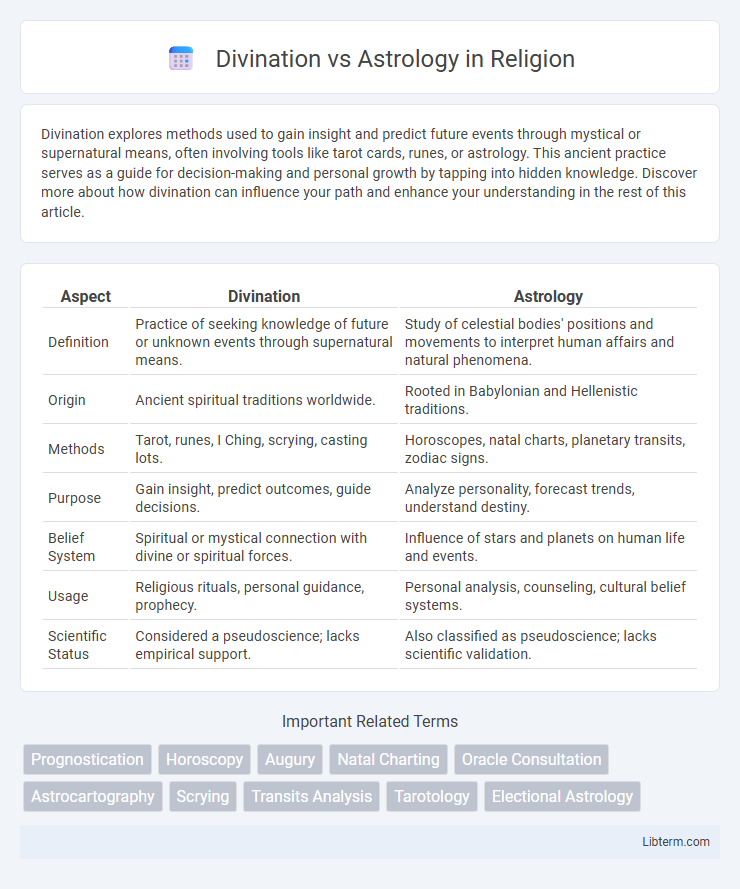Divination explores methods used to gain insight and predict future events through mystical or supernatural means, often involving tools like tarot cards, runes, or astrology. This ancient practice serves as a guide for decision-making and personal growth by tapping into hidden knowledge. Discover more about how divination can influence your path and enhance your understanding in the rest of this article.
Table of Comparison
| Aspect | Divination | Astrology |
|---|---|---|
| Definition | Practice of seeking knowledge of future or unknown events through supernatural means. | Study of celestial bodies' positions and movements to interpret human affairs and natural phenomena. |
| Origin | Ancient spiritual traditions worldwide. | Rooted in Babylonian and Hellenistic traditions. |
| Methods | Tarot, runes, I Ching, scrying, casting lots. | Horoscopes, natal charts, planetary transits, zodiac signs. |
| Purpose | Gain insight, predict outcomes, guide decisions. | Analyze personality, forecast trends, understand destiny. |
| Belief System | Spiritual or mystical connection with divine or spiritual forces. | Influence of stars and planets on human life and events. |
| Usage | Religious rituals, personal guidance, prophecy. | Personal analysis, counseling, cultural belief systems. |
| Scientific Status | Considered a pseudoscience; lacks empirical support. | Also classified as pseudoscience; lacks scientific validation. |
Understanding Divination: Definition and History
Divination is the practice of seeking knowledge or guidance through supernatural means, with origins tracing back to ancient civilizations such as Mesopotamia and Egypt. It encompasses various methods including tarot reading, rune casting, and scrying, each serving as tools to interpret signs or messages from otherworldly sources. Unlike astrology, which relies on celestial patterns and planetary movements, divination is more focused on intuitive insights and symbolic interpretation within diverse cultural contexts.
Exploring Astrology: Origins and Core Principles
Astrology traces its origins to ancient Mesopotamia, where early civilizations developed the zodiac system to interpret celestial movements and their influence on human affairs. The core principles of astrology revolve around the belief that the positions of stars, planets, and celestial bodies at specific times, such as birth, impact personality traits, behaviors, and future events. Unlike general divination methods, astrology uses a structured framework based on astronomical observations and symbolic meanings to provide insights and predictions.
Key Differences Between Divination and Astrology
Divination involves interpreting signs, symbols, or phenomena to predict future events, often using tools like tarot cards, runes, or pendulums, while astrology specifically studies the influence of celestial bodies on human behavior and fate based on birth charts and planetary positions. Astrology relies on astronomical data and mathematical calculations to generate horoscopes, whereas divination methods are largely intuitive and symbolic without a standardized scientific framework. The key difference lies in astrology's structured cosmic analysis contrasted with divination's diverse, interpretive practices aimed at gaining insight or guidance.
Popular Methods of Divination Explained
Popular methods of divination include tarot card reading, rune casting, and scrying, each offering unique symbolic insights into future possibilities or personal guidance. Unlike astrology, which interprets celestial movements and planetary alignments to predict events and personality traits, divination focuses on using physical tools or natural phenomena to access intuitive knowledge. These practices serve as complementary approaches within the broader metaphysical framework, catering to diverse spiritual needs.
Fundamental Techniques in Astrology
Astrology relies on fundamental techniques such as natal chart interpretation, planetary transits, and synastry to analyze celestial influences on human behavior and events. Divination encompasses various methods including tarot reading, runes, and I Ching, focusing on direct insight or guidance from spiritual or mystical sources. Astrology's precision is anchored in mathematical calculations of planetary positions and their aspects, which distinguishes it from broader divinatory practices.
The Role of Intuition in Divination Practices
Intuition plays a central role in divination practices, acting as the internal compass that guides practitioners in interpreting symbols, signs, and messages. Unlike astrology, which relies on calculated celestial positions and empirical data, divination emphasizes personal insight and emotional resonance to unlock hidden meanings. This intuitive process enables a dynamic interaction between the seeker and the divinatory tools, fostering a deeper connection to subconscious wisdom.
Scientific Perspectives on Divination and Astrology
Scientific perspectives on divination and astrology emphasize their lack of empirical evidence and reproducibility, categorizing both as pseudosciences rather than science-based disciplines. Divination, relying on symbolic interpretation and subjective intuition, contrasts sharply with astrology's hypothesis of celestial influences on human behavior, which numerous studies have failed to validate statistically. The scientific community largely attributes the perceived accuracy of both practices to cognitive biases like confirmation bias and the placebo effect.
Cultural Significance Across Time and Societies
Divination and astrology have held vital cultural significance across diverse societies, shaping belief systems and guiding decision-making from ancient Mesopotamia to modern times. Divination practices, ranging from oracle readings in Greece to Ifa rituals in West Africa, served as mediums to interpret divine messages and influence communal actions. Astrology's enduring presence in Chinese, Indian, and Western cultures reflects its role in understanding cosmic patterns and human destiny, reinforcing societal values and temporal cycles.
Divination vs Astrology: Uses in Modern Life
Divination and astrology serve distinct roles in modern life, with divination techniques like tarot reading and rune casting offering personalized guidance and decision-making insights. Astrology relies on the analysis of celestial patterns and birth charts to interpret personality traits, forecast events, and understand life cycles. Both practices are used for self-reflection, spiritual growth, and navigating uncertainty in contemporary settings.
Choosing Between Divination and Astrology for Guidance
Choosing between divination and astrology for guidance depends on the type of insight desired; divination offers direct answers through methods like tarot reading or rune casting, while astrology provides a broader understanding of personality traits and life cycles based on celestial positions. Divination is often used for specific questions or situations, offering immediate clarity, whereas astrology requires interpretation of birth charts and planetary movements to forecast trends and potential outcomes. Considering personal preference for either symbolic interpretation or cosmic analysis can help determine the most effective guidance tool.
Divination Infographic

 libterm.com
libterm.com